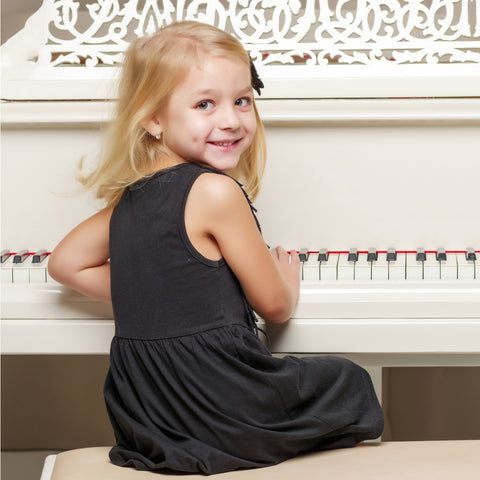Piano From A Child's Point of View

If you look at piano from a child’s point of view, you will see something quite different from what parents and teachers see. All that matters is that the child enjoys starting to play the piano, by whatever method.
In addition, the child should be slowly taught how to read music. It is important for the parent or teacher to never allow the child to feel like a failure.
It is important that the child feels good about the piano lessons. It is not how the teacher evaluates the child’s progress in their piano book. An important point to emphasize is that you can only lose the battle of the piano once. Once your child feels defeated, they won’t want to play. If they do, they will do so grudgingly. That’s simply a child’s nature. So how is a teacher or parent to proceed?
Emphasize Enthusiasm
Better to lower the bar slightly, sometimes dramatically, and proceed slowly rather than demand too much too soon and deflate the child’s enthusiasm. It takes a creative teacher to do this. Almost all teachers prefer instead to follow page to page in the standard child’s piano book. This rote process bores children, even those who are the most diligent and cooperative.
Why Conventional Teachers Go Page To Page
There are several reasons why piano teachers take this “page to page“ approach. First and foremost, the cause is laziness. It is easier for the teacher to proceed using this “page to page” method. There is no child’s piano book ever made that can compare to a teacher patiently engaging the child on their own level in a magical world called “music.”
If the teacher follows a text alone, there is no room for error. The child either learns what’s on the page in the piano book or is made to feel like a failure. To disobey is to risk the teacher’s disapproval.
Piano Is Easy
What Does The Child Think Of Page To Page?
But what about the child’s point of view of that same piano lesson that goes from “page to page?” In the child’s mind they are asking, “Why is this so boring? I thought music was this fun stuff that sounded good….” That is a child’s perception of music as we present it to them before piano lessons. Music is fun and we sway and dance and sing to it as toddlers.
Suddenly, you want this same child to make music by reading it off of a page in a conventional child’s piano book. The result is the predictable 90% failure rate for which conventional piano lessons are famous.
Get Kids To Play Happily On Their Own Level
You should be glad to see your child happily experimenting. Leave the thoughts of Carnegie Hall and the standards of conventional piano teachers behind. All that matters is that your child enjoys the piano and wants to do it more.
Most people assume kids quit because conventional lessons are too difficult, and that is partly true. The piano is hard for most kids unless you bend over backwards. Get them to take baby steps toward playing. Do not diminishing any natural enthusiasm for music they may have.
Numbers Are The First Tool A Child Has
Numbers are the first method that a child uses to order their world. Remember “This Little Piggy?” a basic counting game? Were you teaching your child to count to five, or that they had five digits? In either case, consciously or not, you were teaching them numbers, and you were both having fun doing it!
Counting verbally usually comes before letter perception in terms of child development. Numbers are very deeply ingrained in children’s minds, it’s just part of how we grow up.
REFERENCES
Child’s Point of View
Don't Tell Kids How Hard the Piano Is
Number Sheets For The Piano
The Pillow and the Piano
What The Piano Means To Your Child
Finding A Child’s Piano Comfort Zone
Why Kids Need Freedom To Learn Piano
A Bill of Rights for Kid’s Piano
How Kids See The Piano
Inside A Kid’s Head During A Piano Lesson
Kids Don’t Care What’s In The Piano Book
Let The Child Appear To Lead The Piano Lesson
What Bores Children In Piano Lessons?
What Kids Like About Piano Lessons
The Teacher Is More Important Than The Book
Strict Piano Lessons Don’t Work For Kids
The Piano Is A Child’s Thinking Machine
How A Child Sees The Piano Keyboard
Kids Like Holiday Songs On The Piano
I Want To Learn That Song That Goes…
Follow The Child’s Pace With Piano Lessons
Discipline and Repetition Don’t Work in Kid’s Piano
Every Child Learns Piano Differently
Funny Piano Lessons
Engage Kids With The Piano
How A Child Sees The Piano
What Kids Think In A Piano Lesson
What Is Soft Piano?
Freestyle Kid’s Piano
What Kids Need In Piano Lessons
Piano By The Numbers
Piano With Numbers Keys




